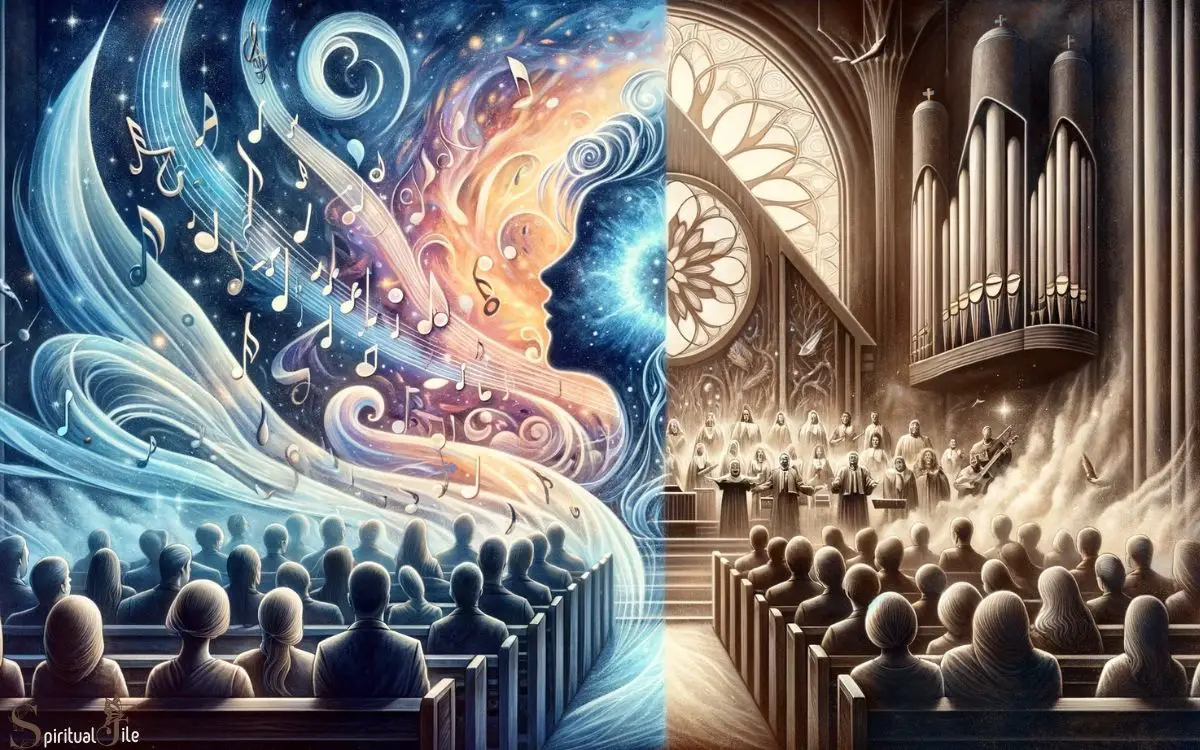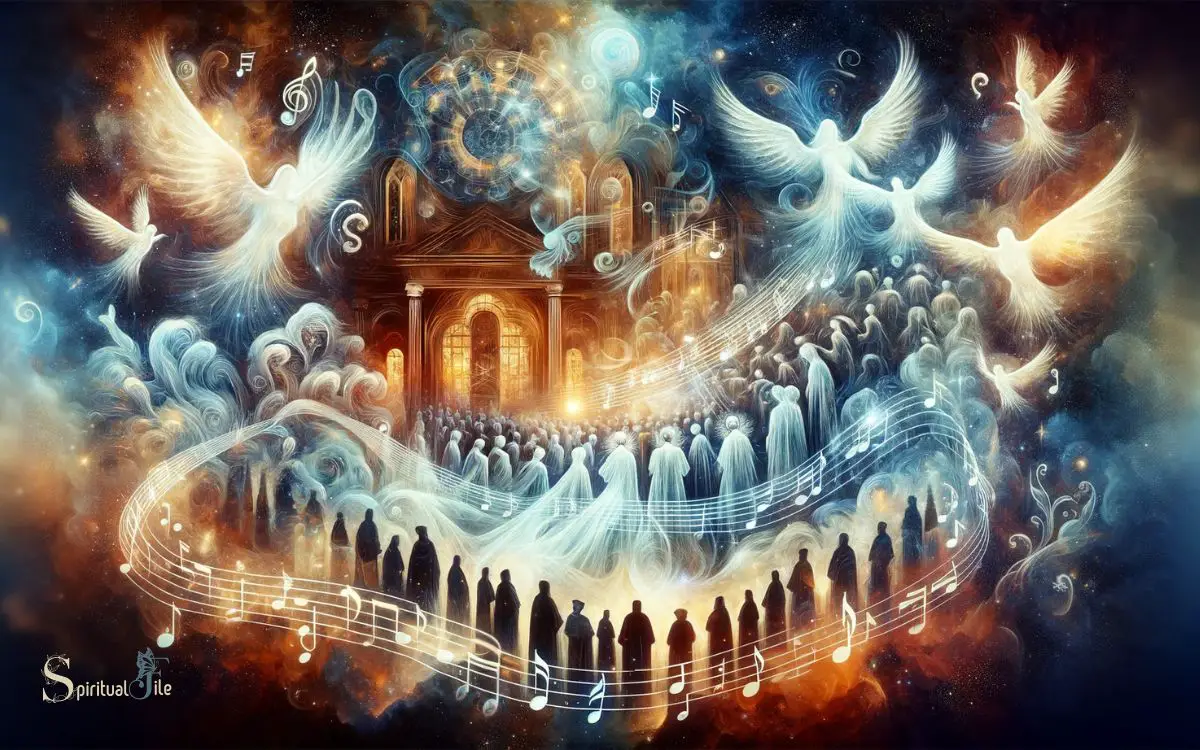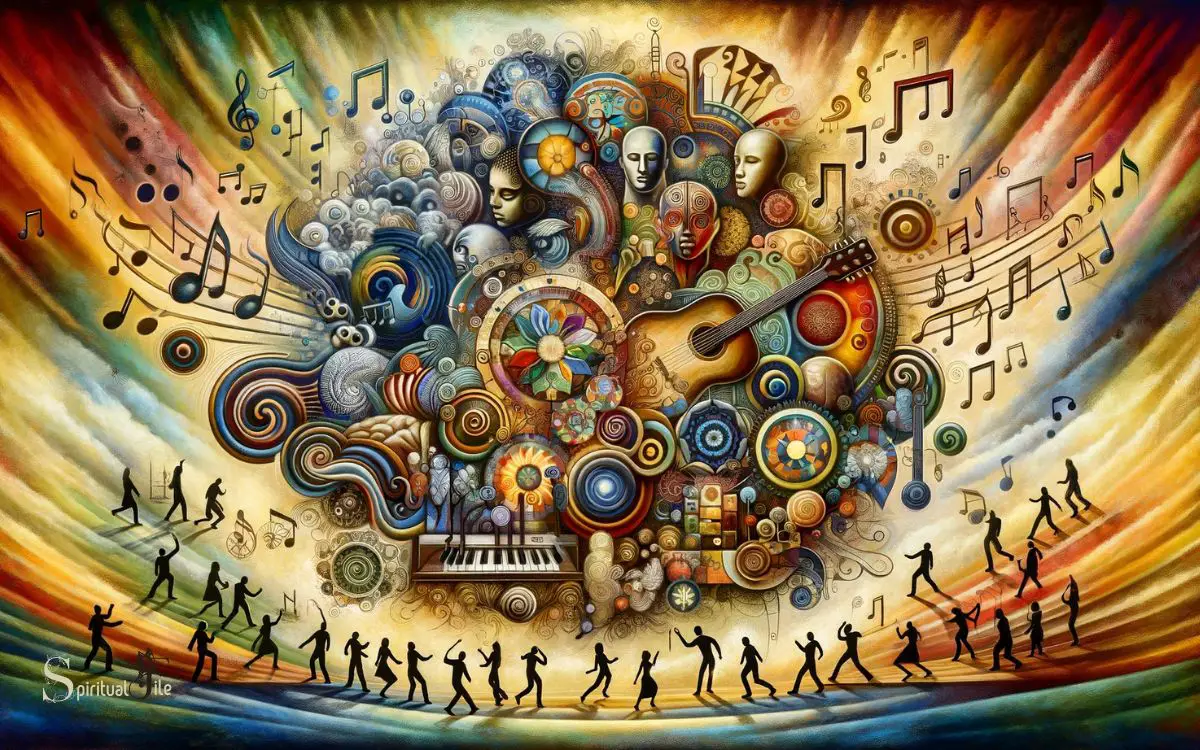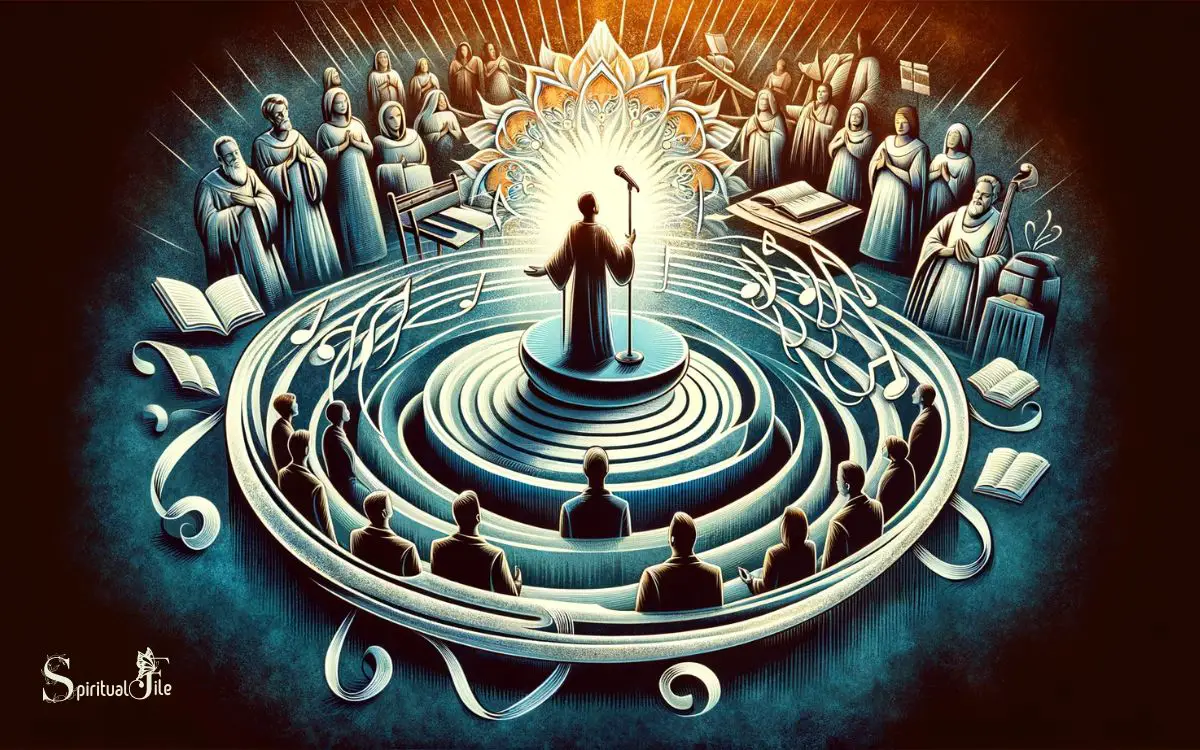Spiritual Vs Gospel Music: Explain!
Spiritual music and gospel music are two genres deeply rooted in African American history and religious traditions. While both are often used interchangeably, they have distinct characteristics and origins.
Spiritual music, also known as Negro spirituals, was born out of the African American experience of enslavement.
These songs often contained coded messages and served as a form of resistance and hope for freedom. Examples of well-known spirituals include ‘Swing Low, Sweet Chariot’ and ‘Wade in the Water.’
Gospel music emerged in the early 20th century and was heavily influenced by spirituals, blues, and jazz.
It is associated with the Christian church and is performed to praise and worship. Famous gospel artists include Mahalia Jackson and Aretha Franklin.
Spiritual Music:
- Origin: During slavery in the United States.
- Themes: Suffering, hope, freedom.
- Style: Acapella or minimal instrumentation.
Gospel Music:
- Origin: Early 20th century in African American churches.
- Themes: Praise, worship, joy.
- Style: Full band, complex harmonies.
Exploring the depths of spiritual and gospel music reveals a tapestry of cultural resilience and spiritual fervor. These genres offer a window into the soulful journey of African American history and its enduring legacy in the tapestry of American music.

Key Takeaway
6 Aspects: Spiritual Vs Gospel Music
| Aspect | Spiritual Music | Gospel Music |
|---|---|---|
| Origin | Rooted in African American slave traditions | Emerged from African American church music |
| Themes | Reflects personal spirituality and beliefs | Focuses on Christian themes and gospel |
| Instruments | Often minimal, vocals and simple | Incorporates a variety of instruments |
| Performance Setting | Can be performed in various settings | Mainly associated with church services |
| Audience | Diverse audience, broader appeal | Primarily targeted at Christian community |
| Influence | Inspirational, meditative | Energetic, uplifting, and evangelistic |
Origins of Spiritual and Gospel Music

The origins of spiritual and gospel music can be traced back to the early African American religious experience, where they evolved within the context of worship and communal expression.
Spiritual music, also known as Negro spirituals, emerged during the period of enslavement in the United States. It served as a means for enslaved individuals to express their sorrows, hopes, and beliefs, often drawing from biblical stories and imagery.
These spirituals were deeply rooted in African musical traditions and Christian hymns, blending to create a unique form of musical expression.
On the other hand, gospel music originated in the early 20th century and was influenced by various musical styles, including blues and jazz.
Gospel music aimed to spread the message of Christian faith, often featuring lively rhythms and powerful vocals to engage congregations in worship.
Musical Characteristics and Styles

Rooted in distinct musical traditions, spiritual and gospel music have evolved over time to encompass a wide range of musical characteristics and styles. These genres share some similarities but also have unique musical elements that set them apart.
The musical characteristics and styles of spiritual and gospel music include:
Call and response: Both genres often incorporate call and response patterns, creating a dynamic interaction between the lead singer and the choir or congregation.
Emotional delivery: Both spiritual and gospel music are known for their emotive and powerful vocal deliveries, conveying deep emotions and invoking a sense of spiritual connection.
Instrumentation: While spiritual music traditionally relies on more simplistic instrumentation, gospel music often incorporates a wider range of instruments, including piano, organ, drums, and guitars.
Harmonies: Both genres feature rich vocal harmonies, enhancing the overall sound and creating a sense of unity and togetherness.
Rhythmic diversity: Gospel music tends to embrace a more diverse range of rhythmic patterns and grooves compared to spiritual music, allowing for greater musical expression and energy.
Themes and Inspirations

Themes and inspirations in spiritual and gospel music are deeply rooted in divine guidance, personal faith experiences, and the reflection of biblical teachings. These elements serve as the foundation for the lyrical content and musical compositions in both genres.
Understanding the themes and inspirations behind the music provides insight into the spiritual and emotional connections that listeners experience.
Divine Guidance in Lyrics
In spiritual and gospel music, the lyrics often reflect divine guidance and inspiration. This is evident in the themes and inspirations that are commonly found in the lyrics of these genres.
Some of the common themes and inspirations include:
- Faith: The lyrics often convey a deep sense of faith in a higher power and the belief in divine guidance.
- Hope: Messages of hope, encouragement, and perseverance are frequently portrayed, offering listeners a sense of optimism and comfort.
- Redemption: The theme of redemption and finding salvation through spiritual means is a recurring motif in many spiritual and gospel songs.
- Love and Compassion: The lyrics often express love and compassion towards others, reflecting the teachings of kindness and empathy.
- Overcoming Adversity: Many songs portray the theme of overcoming challenges through faith and divine support, offering listeners strength and resilience.
These themes and inspirations serve to uplift and inspire audiences, reflecting the profound impact of divine guidance in spiritual and gospel music.
Personal Faith Experiences
Continuing from the themes and inspirations of divine guidance in the previous subtopic, the personal faith experiences reflected in spiritual and gospel music serve as powerful testimonies of believers’ journeys.
These genres often draw from the deep well of personal experiences with faith, addressing themes of struggle, triumph, doubt, and unwavering hope.
The lyrics and melodies are infused with the raw emotions and fervent devotion of those who have encountered profound spiritual encounters.
Whether it’s the joyous celebration of gospel music or the introspective, soul-stirring nature of spiritual music, the common thread is the expression of personal encounters with the divine.
These songs offer solace, inspiration, and a sense of communal understanding, resonating with listeners who seek a connection to the profound and transformative nature of faith.
Reflecting Biblical Teachings
The portrayal of biblical teachings in spiritual and gospel music is a profound reflection of believers’ understanding of the divine message.
It is through the themes and inspirations drawn from the Bible that these music genres convey the timeless truths and values espoused in the scriptures.
Some of the key biblical teachings reflected in spiritual and gospel music include:
- Redemption and Salvation through faith in Christ
- God’s unending love and grace for humanity
- The power of prayer and seeking God’s guidance
- The promise of eternal life and hope in the midst of trials
- The call to love and serve others as an expression of one’s faith
These themes not only resonate with believers but also serve as a source of comfort and inspiration, reinforcing their spiritual journey.
Influence on Culture and Society

Having deeply rooted influences on culture and society, spiritual and gospel music have played significant roles in shaping the traditions and values of communities.
These genres have provided a platform for expressing faith, hope, and resilience, reflecting the experiences and struggles of individuals and communities.
Through their powerful messages and emotive melodies, spiritual and gospel music have fostered a sense of unity and solidarity, promoting social cohesion and collective identity.
Moreover, they have contributed to the preservation of cultural heritage and traditions, serving as a means of passing down stories and wisdom from one generation to another.
The impact of spiritual and gospel music on culture and society is undeniable, as they continue to inspire and uplift people from diverse backgrounds, transcending boundaries and fostering understanding.
This rich legacy sets the stage for exploring their evolution and innovation in contemporary contexts.
Evolution and Innovation

One of the most striking aspects of the evolution and innovation within spiritual and gospel music is the way in which these genres have adapted to contemporary musical styles and technologies, expanding their reach and impact.
This evolution has been marked by several key developments:
- Incorporation of Contemporary Musical Elements: Spiritual and gospel music have integrated elements of jazz, R&B, and hip-hop, creating a fusion that resonates with modern audiences.
- Utilization of Digital Platforms: Artists have leveraged social media, streaming services, and online platforms to share their music globally, reaching a diverse audience.
- Collaboration with Mainstream Artists: There has been an increasing trend of collaboration between spiritual/gospel artists and mainstream musicians, resulting in innovative and boundary-breaking music.
- Innovative Production Techniques: Producers have incorporated modern production techniques, enhancing the sonic quality and appeal of spiritual and gospel music.
- Engagement with Visual Mediums: The use of music videos and visual storytelling has become prevalent, enriching the overall artistic expression of spiritual and gospel music.
Role in Religious Worship

The role of music in religious worship is a topic that holds significant importance in the spiritual and gospel music genres. Understanding how spiritual and gospel music influences the worship experience is essential for appreciating their roles in religious settings.
The differences in the worship atmosphere created by these musical styles can have a profound impact on congregants.
Worship Atmosphere Differences
In religious worship, the atmosphere cultivated by spiritual and gospel music differs significantly in its impact on the congregation’s spiritual experience.
Spiritual Music:
- Evokes a sense of reverence and introspection.
- Often features traditional hymns and meditative melodies.
- Encourages quiet contemplation and personal reflection.
- Sets a solemn and tranquil tone within the worship space.
- Fosters a deep connection to sacred traditions and history.
Gospel Music:
- Creates an atmosphere of joy and celebration.
- Involves lively rhythms and uplifting lyrics.
- Promotes communal participation and exuberant praise.
- Generates a vibrant and energetic ambiance during worship.
- Inspires a sense of unity and shared spiritual enthusiasm among congregants.
The distinct atmospheres formed by these musical styles play a crucial role in shaping the overall worship experience for congregants.
This sets the stage to discuss the subsequent section about the ‘influence on congregants’.
Influence on Congregants
A significant aspect of the role of spiritual and gospel music in religious worship is their influence on congregants’ spiritual engagement and emotional experience.
Spiritual music often fosters a contemplative and meditative atmosphere, encouraging personal reflection and a sense of inner peace among congregants.
Its soothing melodies and calming rhythms can facilitate a deep connection with one’s spirituality, allowing individuals to feel closer to their faith and beliefs.
On the other hand, gospel music tends to evoke a more jubilant and celebratory atmosphere, igniting a sense of communal joy and exuberance.
The energetic and uplifting nature of gospel music can uplift congregants’ spirits, encouraging active participation and emotional expression during religious worship.
Both genres play a vital role in shaping congregants’ religious experiences, influencing their moods and spiritual connectivity during worship services.
Impact on Contemporary Music

Spiritual and gospel music have significantly influenced contemporary music, shaping its evolution and diversification over the years.
This influence is evident in various aspects of contemporary music, including:
- Rhythm and Melody: Spiritual and gospel music introduced unique rhythmic patterns and melodic structures that have been incorporated into contemporary genres.
- Lyricism: The profound and emotive lyrical content of spiritual and gospel music has inspired contemporary songwriting, highlighting themes of hope, love, and resilience.
- Vocal Techniques: The powerful, soulful vocal techniques characteristic of spiritual and gospel music have become integral to many contemporary vocal performances.
- Fusion Genres: The fusion of spiritual and gospel elements with other musical styles has given rise to new and innovative contemporary genres.
- Social Impact: Contemporary artists continue to draw inspiration from the social and cultural impact of spiritual and gospel music, addressing relevant issues in their own work.
What are the key differences between Spiritual and Gospel music?
Spiritual music often focuses on faith, worship, and transcendence, while Gospel music is centered around Christian beliefs and experiences. The key difference lies in the religious context and the emotional depth of the lyrics. The preference for either genre may depend on one’s spiritual versus skeptical personality.
FAQ About Spiritual Vs Gospel Music
How Do the Lyrics of Spiritual and Gospel Music Differ in Terms of Their Themes and Messages?
The lyrics of spiritual and gospel music differ in their themes and messages. Spiritual music often focuses on personal reflection and connection to a higher power and spreading the message of faith and salvation.
What Are Some Notable Examples of Spiritual and Gospel Music Influencing Popular Culture Outside of the Religious Sphere?
Notable examples of spiritual and gospel music influencing popular culture beyond the religious sphere include the impact of soul and R&B music.
The influence of gospel choirs in popular music, and the use of spiritual themes in contemporary art and literature.
How Has the Evolution of Technology and Media Impacted the Distribution and Popularity of Spiritual and Gospel Music?
The evolution of technology and media has significantly impacted the distribution and popularity of spiritual and gospel music.
With the advent of streaming platforms and social media, these genres have gained broader reach and accessibility to diverse audiences.
What Role Do Spiritual and Gospel Music Play in Social Justice Movements and Activism?
Spiritual and gospel music serve as a powerful tool for social justice movements and activism, providing a platform for expressing solidarity, resilience, and hope.
These genres have historically played a pivotal role in amplifying marginalized voices and advocating for change.
How Do Different Regions and Cultures Interpret and Incorporate Spiritual and Gospel Music Into Their Own Musical Traditions?
Different regions and cultures interpret and incorporate spiritual and gospel music into their musical traditions through unique adaptations that reflect their local customs, beliefs, and musical styles.
This process enriches the diversity of musical expressions worldwide.
Conclusion
Spiritual and gospel music share historical roots and musical characteristics, yet they differ in themes and inspirations. Both genres have had a significant impact on culture and society, and have continued to evolve and innovate over time.
Their role in religious worship has been influential, and their impact on contemporary music is undeniable. These genres continue to inspire and uplift listeners, transcending boundaries and bringing people together through their powerful messages and melodies.






